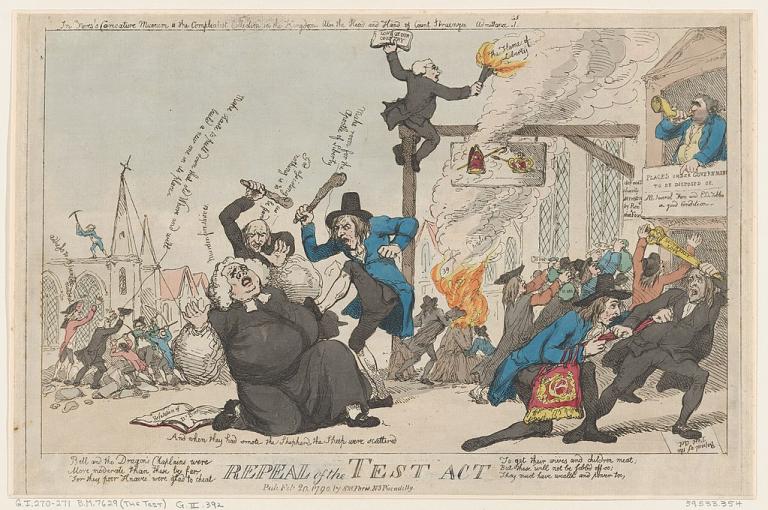
The Freedom of Religion is enshrined in the United States Constitution, the fundamental law of the land. Nevertheless, it is still possible to thwart religious liberty.
One way is to permit religious liberty but restrict what people with certain beliefs are allowed to do. This is what Great Britain did in the 17th and 18th century to suppress Roman Catholics, Protestant dissenters (Baptists, Presbyterians, etc.), and others who would not adhere to the Church of England, particularly in Ireland.
According to the so-called Penal Laws, you were free to be a Catholic or a Baptist. But if you were, you could not go to the university, not hold public office, not be a lawyer, not be a teacher, not possess firearms, not adopt children, among many other restrictions, including limits on property and economic transactions. (Go here for a list).
Nathanael Blake, writing in the Federalist, looks at recent attempts to disqualify Christians from public office and the professions, as well as disqualifying Christian institutions such as schools and adoption agencies, on the grounds that their Christian moral teachings are discriminatory. He sees the return of the “Penal Law” mindset.
From Nathanael Blake, Today’s Left Now Openly Aims To Make Christians Second-Class Citizens:
Religious liberty was technically allowed, but those who exercised it in nonconforming ways found their other freedoms curtailed. In Burke’s words, a man’s conscience was made “a trap to catch his liberty.”
This is the strategy being developed by much of the left against many traditional Christians today. The First Amendment protects (for now) our right to believe what we will in our homes and churches, but we will be penalized for our beliefs in the professions, the marketplace, and in government. The horror of many on the left at learning that Christians are still allowed to run their own schools with standards of behavior drawn from traditional Christian teaching—and that the wife of a prominent public official works at such a school—is only the latest example of this campaign.
The litany of assaults on religious liberty has become familiar. Catholic judicial nominees are being cross-examined over membership in the Knights of Columbus. The Obama administration was fixated on forcing nuns to fund and facilitate the distribution of birth control, and blue states took up the cause when Trump was elected. Punishing Christians who predictably decline to participate in celebrating same-sex weddings or “gender transition” events is another obsession.
While they claim to want equality, the left is deliberately establishing a system that will reduce traditional Christians and other religious dissenters to second-class citizenship. Observe how in conflicts between religious liberty and the sexual revolution, leftists seek not to accommodate and tolerate religious nonconformists, but to delegitimize and punish them.
They are quite clear about their goals for orthodox Christians. They believe we are bigots, and that bigots should not be allowed to run schools, work in government, or hold good jobs. If we will not recant and bend the knee to the sexual revolution, they want to close our schools, hospitals, and charities, drive us out of our professions, shutter our businesses, and get us fired from any job they deem above our station. Although they are willing to use private means and social pressure, their ultimate goal is a legal regime that will treat us very much like the English treated the Irish Catholics.
The First Amendment of the Bill of Rights had these Penal Laws in mind, especially as they were applied against the Protestant dissenters who fled to America. The Constitution should thus protect Americans from such practices having the force of law, presumably the private sector could implement something similar. Psychological associations could reject counselors who have qualms about homosexuality; the American Medical Association could refuse recognition of physicians who refuse to commit abortion; accrediting agencies could refuse to accredit Christians schools and universities if they hold to Christian sexual morality; Christian adoption agencies could lose the ability to place children if they favor traditionally-married couples (which is already happening).
Christians have a recourse, though, to private-sector discrimination: the anti-discrimination laws! Religion is a protected category just as much as race, sex, and now sexual preference is. In fact, according to the Supreme Court decision in the Masterpiece Cake case, religious objections to gay marriage are “protected views.”
Which means Christians disqualified from a job or a benefit because of their religious convictions can file a discrimination complaint and pursue litigation, which may be necessary in order to define religious liberty for our times.
Yes, Christians should expect to be hated (Matthew 10:22), but they can also stand up for their legal rights as St. Paul did (Acts 25).
Illustration: “Repeal of the Test Act,” by Thomas Rowlandson [CC0] via Wikimedia Commons [A cartoon warning about how the papists and dissenters would run wild and beat up law-abiding Anglicans if this Penal Law were repealed.]














